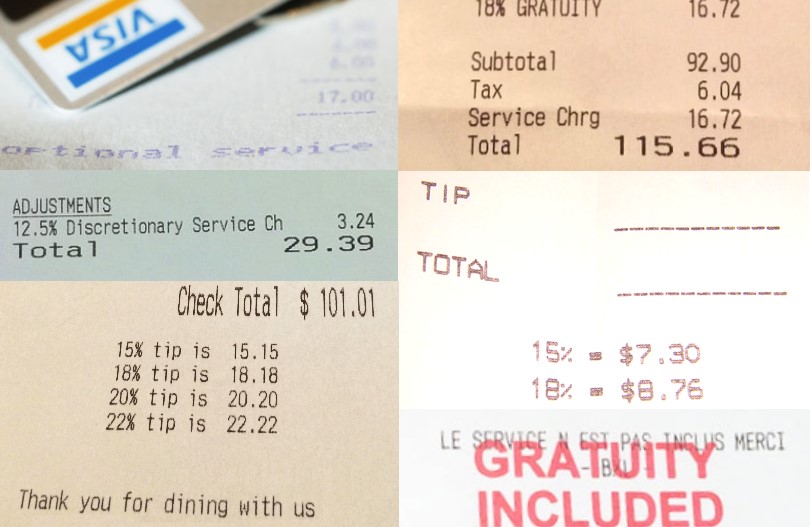Discretionary Service Charge
I was recently on Talk Radio discussing the disreputable “discretionary service charge” in restaurants and the record of some food establishments of not always passing on the whole amount to waiting staff. Now there are UK Government plans to prevent its automatic inclusion on bills so that customers don’t feel obliged to pay it – particularly if after a bottle of wine or two they have less capacity for even noticing it, and may end up tipping twice and with no guarantee that it will even go to the staff that served them. Wine is not the explanation for the #TipsForJesus trend in the USA of excessively generous tipping running to many times the bill total.
The very phrase, discretionary service charge, seems oxymoronic when it is hardly discretionary or optional – some places use the phrase “optional gratuity included”. The British, especially, may feel driven by guilt to pay it, or by a desire not to make a scene in asking for it to be removed.
A survey by the Daily Telegraph found that 88% thought the practice of confusing discretionary charges should be banned in favour of greater transparency as to who gets what from a tip.
Restaurants taking a hidden service cut
Last year, it was revealed that several well-known chains including Ask Italian, Côte, Giraffe, Pizza Express, Strada, Zizzi, and more, were holding back part or all of customer tips and taking a cut, or charge, or redistributing it, removing the personal element of the tip direct to the staff one is served by. Several of these restaurants subsequently changed their policies after campaigns to boycott the worst culprits. A Unite campaign against Pizza Express attracted 10,000 signatures and saw them drop their 8% admin fee on tips. Giraffe, similarly, also decided to drop their 10% administration fee.
“Research published in 2009 found that one in five restaurants did not pass tips to their staff, yet the vast majority of customers said they wanted waiting staff to receive tips left for them. More than three quarters wanted to see the restaurant’s tipping policy clearly displayed.” – Daily Telegraph
A recent survey by OpenTable found that 87% of UK customers always leave a tip, and which averages 9% of the bill. One could argue that “optional service charges” of 10-20% (typically 10-12.5%) aim to raise staff tips, but when restaurant deductions are taken into account any transparency of motive seems suspect.
HM Government Review into Tipping
After a Government evidence-based review, proposals for change to make tipping fairer for waiting staff and customers alike, are being considered with a further consultation until 27 June 2016, and include:
- Updating the current voluntary code of practice and putting it on a statutory footing to increase employer compliance
- Increasing transparency for consumers to make it clearer that suggested discretionary payments for service are discretionary and that consumers are free to choose
- Preventing or limiting any employer deduction from discretionary payments for service, except for those required under tax law
- Whether to ban or restrict the levying of table sales charges on staff – a fee paid by waiting staff based on their sales during a shift
- How to incentivise and increase the prevalence of well managed tronc systems.
“…we want workers who earn a tip to be able to keep it. That’s why I, like many others, was disappointed by the tipping practices of some of our well-known chains. This has to change. Today I’m setting out our proposals to make tipping fairer, clamping down on unfair practices and securing a better deal for the millions of workers in the service industry” – Business Secretary Sajid Javid
Tronc tips
A tronc scheme, originally from the French tronc des pauvres meaning “poor box”, is a pooling of tips for redistribution. They can offer tax efficiencies for staff and employer alike. The Government is keen to see more well-managed tronc schemes in place.
One tip, is to always pay a gratuity in cash, and if using a voucher code or dining club card discount, try to tip on what would have been the pre-discounted amount.
Divine Generosity? Tips for Jesus!
Over in the US, some better-off diners where tipping is more commonly 15-20% anyway, are going the extra mile, and paying-it-forward with large super generous tips of $100-$6,000 with up to 4,000% tips! Often noted as “Tips for Jesus” on the bill, they are not intended to be religious in nature and started out agnostic, though their use and tagging has spread since, with the server’s delight at the huge tips being shared on Instagram and Twitter. The anonymous philanthropist has doled out over $250,000 in tips in just two-and-a-half years.
